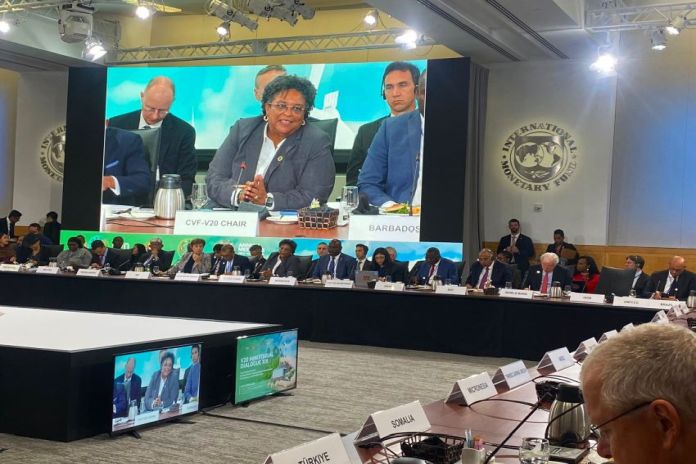By GIS
WASHINGTON / BARBADOS – Finance Ministers from the Vulnerable Twenty (V20) Group, representing 70 climate-vulnerable nations, convened their 13th Ministerial Dialogue on Wednesday, on the sidelines of the World Bank Annual Meetings in Washington, DC. Ministers at the meeting issued a communique, calling for urgent financial governance reforms and far more equitable climate finance.
A V20 communique, adopted at the meeting, endorsed initiatives and recommendations to deliver fair access to climate finance and debt solutions with relief and disaster support, while promoting resilience and sustainable development. Finance ministers at the meeting pointed out that recent climate disasters have exacerbated the debt and climate vulnerabilities of V20 nations.
The V20 communique criticized the current financial system for “diverting crucial funds from the poorest nations to the wealthiest,” and stressed the need for better representation of climate-vulnerable economies in Bretton Woods Institutions, through more inclusive discussions and balanced governance.
Highlighting the work of the G20 Independent Expert Group (IEG), the Communique pointed to the “2023 net outflows from Emerging and Developing Countries which rose by USD 68 billion to USD 200 billion through extractions from private creditors in interest and net repayments.” This trend is forcing V20 countries to cut spending on health, education, and infrastructure.
Speaking at the ministerial dialogue, Prime Minister of Barbados, Mia Amor Mottley, chair of the CVF-V20 Presidency, said:
“The difficulty relates to scale and speed. In the absence of definitive decisions that can give us more space and time [to invest in climate and development], this is very worrying. The world is distracted by war, elections and geopolitics. That is our current reality. If I could recommend to this body a single action that would buy us more space. It would be settling a global methane agreement.”
Prime Minister Mottley added that new measures, such as a global taxation on shipping, should be used to fund adaptation needs in climate-vulnerable countries, particularly coastal countries.
In addition to matters related to the impact of the climate crisis on debt and liquidity for CVF V20 members, during the two years of the Barbados presidency, Prime Minister Mottley will also focus on the impacts of climate change on human health, placing increased stress on health care systems, and the multidimensional nature of climate crisis.
Sovereign debt resolution was a core part of today’s discussions, as climate impacts exacerbate the debt crisis, further limiting the fiscal space needed to drive climate resilience investments. Finance Ministers noted “the need for the Common Framework to be overhauled to involve creditors, expand eligibility to middle-income countries and produce debt relief proportionate to climate and development investment needs.”
Significant emphasis was placed on Debt Sustainability Analyses (DSAs) that incorporate climate shocks and the full benefits of development-positive climate investments as well as climate-positive development investments.
Key points from the V20 communique
The communique adopted following today’s discussions highlighted that “debt crises and climate impacts feed off each other, choking fund flows needed for resilience.” The Communique emphasized, “resolving sovereign debt must be central to any climate finance deal.”
It echoed the CVF leaders declaration issued during the UNGA in New York in September, which called for better representation of climate-vulnerable countries in the International Monetary Fund, noting that the 15th and 16th General Review of Quotas ended without much-needed realignment.
Further highlighting “the inadequacy and inequitable structure of the Global Financial Safety Net,” the Communique called on the IMF to contribute to shock-proofing the global financial system. It also called on the IMF to launch a replenishment drive for the Catastrophe Containment and Relief Trust (CCRT).
The communique emphasized the crucial role of the New Collective Quantified Goal (NCQG) to correct past shortcomings of the $100 billion target. “The NCQG must be ambitious, trackable and actionable,” the Communique stated.





